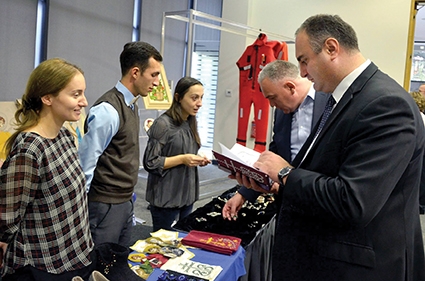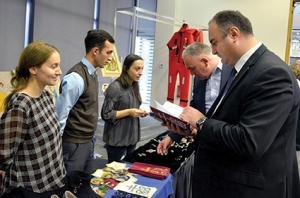Lessons, Challenges and Best Practices from IDP Livelihoods Experience in Georgia
Expo Georgia, Tbilisi, hosted a project closure event on Friday called ‘From Dependancy to Self Sufficiency: Innovative, Effective and Sustainable Livelihood Solutions in Georgia’ organized by Charity Humanitarian Center Abkhazeti (CHCA) and the Danish Refugee Council (DRC), with financial assistance from the European Union.
Prior to the conference, attendees had the chance to browse the exhibition of beneficiary crafts and produce and see a number of the small enterprises that have been set up through the project. The conference itself was both informative and detailed- through presentations the hosts made an in-depth analysis of the situation of IDPs in Georgia, mapping the employment opportunities, discussing the challenges encountered during the implementation of the project, and giving recommendations on the next steps to be undertaken towards making social inclusion and economic empowerment of IDPs more effective.
The Danish refugee council (DRC) and the Charity Humanitarian Center Abkhazeti (CHCA) carried out the joint ‘From Dependancy to Self Sufficiency: Innovative, Effective and Sustainable Livelihood Solutions in Georgia’ project with the primary goal of supporting IDPs, war affected communities and eco-migrants by providing sustainable livelihood solutions for their economic integration. The project was realized in Mtskheta - Mtianeti (Akhalgori), Imereti (Kutaisi and Tskhaltubo), Samegrelo (Zugdidi, Poti), Adjara (Batumi), and Abkhazia (Gali). 516 beneficiaries received project grants ranging from EUR 500 to 4,000 in three directions: Poverty Reduction Grant, Individual Business Grant and Small and Medium Entrepreneurs.
“We all know that the unemployment rate is very high and unemployment amongst IDPs and vulnerable groups is even higher,” said Svend Monrad Graunboel, Country Director of the Danish Refugee Council Georgia and South Caucasus. “The fact that IDPs have a lack of access to land, social skills and proper housing makes it even harder for them to escape poverty.”
He went on to stress the importance of joint initiatives and efforts from the government, NGOs and other entities to find alternative ways for IDPS and vulnerable groups to access jobs. “While working with IDPs, an individual approach should be used in assisting them, and the delivery of the grants should be done in a very cost effective way. No IDP should be left behind and every effort should be made to ensure that IDPs and vulnerable groups have access to opportunities to build a better future,” Graunboel said.
Grigol Gogidze, First Deputy Minister, Ministry of IDPs from the Occupied Territories, Accommodation and Refugees of Georgia also talked about the value of increasing employment opportunities for vulnerable groups. “Support must not be limited to providing them with the necessary minimum of housing and food; support must be addressed towards creating possibilities of employment and income.”
Vincent Rey, Head of Cooperation, Delegation of the European Union to Georgia, agreed, highlighting the significance of joint initiatives from state and private sectors and pledging the continued support of the EU in this regard.
A short documentary film featuring the project beneficiaries was shown at the conference, followed by detailed presentations from Eka Gvalia, Livelihood Project Manager, DRC Georgia; Maia Chenkeli, Program Coordinator, ACF South Mission; Nukri Milorava, Executive Director, CHCA; and Irakli Ujmajuridze, Executive Director, LEPL - IDP Livelihood Agency on livelihood grant schemes, the employment shuttle and employment opportunities, access to information and business consulting and action plans.
The conference finished with the signing of a memorandum of understanding between the DRC and the IDP Livelihood Agency.
GEORGIA TODAY met some of the entrepreneurs and small businesspeople displaying their wares. It was encouraging to see Baia Emkvari and Lasha Sharashenidze’s handmade jewelry and Nana Toloraia’s embroidery, all of them beneficiaries of the project.
“I’ve been interested in handmade jewelry since my childhood,” Emkhvari told us. “The DRC project helped me to buy materials for my works and mannequins to display them.”
She plans to set up a studio in which she can work and from where she can sell her jewelry.
We asked her what she would say to others thinking of taking the plunge and starting their own businesses. “Risk is essential,” she said. “Knowledge comes slowly and then you get to know the market. You should decide exactly what you want to do, do research and then take a risk. That’s the only way to be successful.”
Nana Toloraia disagrees. She started embroidery some 15-20 years ago as a self-taught artist and still remembers her very first work, a parrot. For Nana, motivation and hard work is the key to success. Her plan is to teach embroidery to students and she was very happy with the chance to participate in the DRC project because many people came to the event and showed genuine interest in her works. She received a sewing-machine through the grant and now plans to expand her small business further.
Nino Gugunishvili











